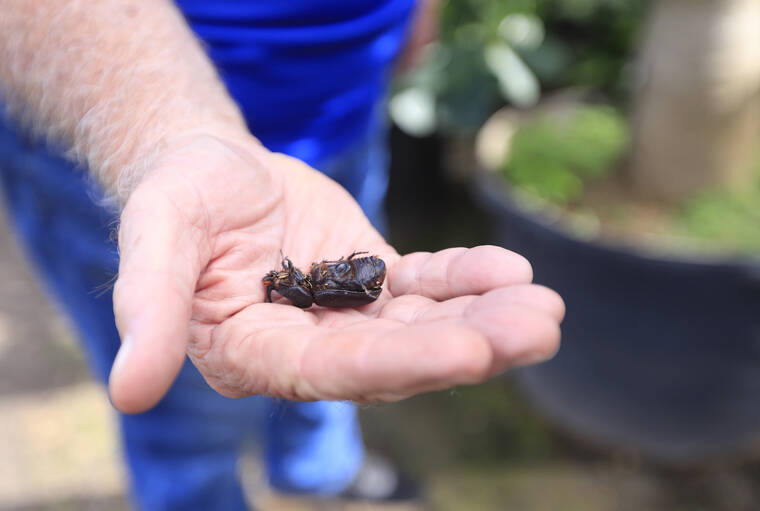Coconut rhinoceros beetle found in trap on Hawaii island

JAMM AQUINO / FEB. 10, 2023
A coconut rhinoceros beetle was found in a trap in Waikoloa on Hawaii island, state agricultural officials said today. Here, a dead coconut rhinoceros beetle found in Kunia on Oahu is shown in 2023.
A coconut rhinoceros beetle has been found in a Hawaii Department of Agriculture trap in Waikoloa, the first detection of the invasive and destructive insect on the Big Island in nearly a year, state officials said today.
Agriculture officials said in a news release that the beetle was in a trap that was about 200 yards from the last Hawaii island detection in October when a Waikoloa resident discovered six grubs, or larvae, in a decaying palm tree stump.
The department set 30 traps around Waikoloa and has been conducting routine monitoring with the help of residents, they said. The Big Island Invasive Species Committee and the University of Hawaii have also set additional traps for the coconut rhinoceros beetle, or CRB.
“CRB surveillance on Hawaii island has been ongoing and early detection is key to prevent the establishment of breeding populations,” Sharon Hurd, chairperson of the Hawaii Board of Agriculture, said in the release. “We ask everyone to keep an eye out for CRB, especially in their compost and mulch piles which are major breeding grounds of the beetle.”
Surveillance for CRB has been ongoing on all islands, including traps at airports, harbors and other strategic locations, officials said.
“CRB is a serious pest of palm trees, primarily coconut palms, as the adult beetles bore into the crowns of the palms to feed on the trees’ sap,” state agriculture officials said in the release. “New unopened fronds are damaged in this way and when fully opened, may break and fall unexpectedly. If CRB kill or damage the growing point of the palm, the tree may die.”
Don't miss out on what's happening!
Stay in touch with breaking news, as it happens, conveniently in your email inbox. It's FREE!
The coconut rhinoceros beetle was first detected on Oahu in 2013, and has since been found in many neighborhoods on the island. It was found on Kauai in May 2023 and in Kihei, Maui, in November, officials said.
Officials ask residents to be vigilant when purchasing mulch, compost and soil products, and to inspect bags for evidence of entry holes. They said an adult beetle is about 2-inches long, all black and has a single horn on its head, and that grubs live in decomposing plant and animal waste.
For more information, visit the CRB Response website at crbhawaii.org, Opens in a new tab Residents can also report possible CRB infestation by calling the state’s toll-free Pest Hotline at (808) 643-PEST (7378).



